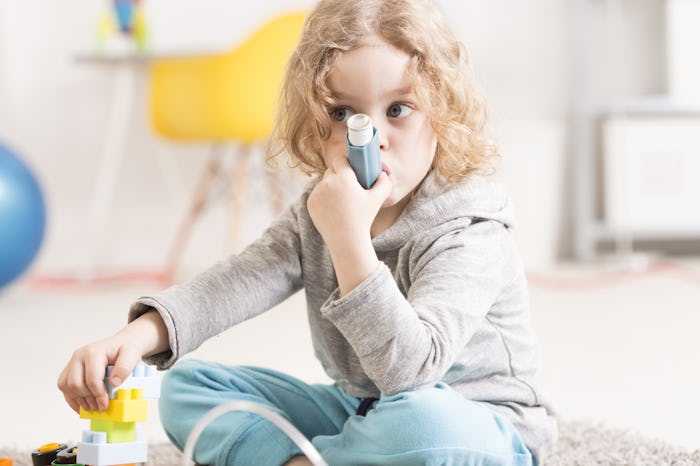Life
More Kids Today Are Suffering From Asthma Than Previous Generations, & Here's Why
Asthma is the leading chronic disease in children, and the prevalence of asthma has been rising in the United States and around the world. More kids today are suffering from asthma than previous generations. The reasons as to why asthma is growing in prevalence are not totally clear, but researchers believe it may due to a number of reasons like tobacco smoke and air pollution from traffic, according to Tufts Now.
About one in 13 people have asthma, according to the Centers for Disease Control and Prevention. That's about 25 million Americans, which means that 7.6 percent of adults and 8.4 percent of children cope with the disease. In fact, asthma has been increasing since the early 1980s in all age, sex, and racial groups, according to the Asthma and Allergy Foundation of America.
The disease is more common in boys than girls, but there are about six million children under the age of 18 who have it. It's the top reason kids missed school days in recent years; in 2013, about 13.8 million kids who missed school days did so as the result of asthma, the Asthma and Allergy Foundation of America reported.
There is a lot that parents can do to prevent or reduce asthma symptoms; for example, by limiting their child's exposure to allergens, according to Parents. But the fact is that the general increase in air pollution means that more kids will get asthma than before, regardless of how much parents keep them away from allergens.
The United States Environmental Protection Agency defines air pollution as "any visible or invisible particle or gas found in the air that is not part of the natural composition of air," according to the Asthma and Allergy Foundation of America. Air pollution includes gases, smoke from fires, volcanic ash and dust particles, and research shows that air pollution can worsen asthma symptoms. As the Asthma and Allergy Foundation of America reports, "A study of young campers with moderate to severe asthma showed that they were 40 percent more likely to have episodes on high pollution summer days than on days with average pollution levels." The problem extends to adults, too. There is an increase in hospital visits for adults with asthma when summer rolls around.
And outdoor air pollution has risen 8 percent in the last 5 years, with fast-growing cities in the developing world worst affected, according to recent data from The World Health Organization. Even outside those cities, there's really no escaping air pollution — 92 percent of the world’s population lives in places with air quality that doesn't live up to WHO standards.
Dr. Maria Neira, director of public health at the WHO in Geneva, told The Guardian that many countries are facing a public health emergency. As the quality of our air declines, the risk of stroke, heart disease, lung cancer, and chronic and acute respiratory diseases, such as asthma, increase.
"Urban air pollution continues to rise at an alarming rate, wreaking havoc on human health," Neira told The Guardian, calling it "one of the biggest problems" the world is facing, "with terrible future costs to society."
As for tobacco smoke, more kids are getting asthma even if they don't become smokers. An asthma attack can occur when secondhand smoke — one of the most common asthma triggers — irritates their airways and triggers an attack. Secondhand smoke contains more than 7,000 chemicals, including hundreds that are toxic and about 70 that can cause cancer, according to the CDC.
In 2016, more than 15 of every 100 U.S. adults aged 18 years or older (15.5 percent) smoked cigarettes, the CDC reported. That's pretty consistent with previous years, though the number of people who smoke is ever-so-slightly declining. So given the fact that kids are being exposed to first- or secondhand smoke and pollution consistently throughout their youth, it's no wonder they're developing asthma.
There are ways to prevent your children from developing asthma, but vacuuming up after your pet and taking your cigarette breaks outside are only small steps that are part of a much bigger, global problem.
Editor's note: After publication, we discovered this article did not meet our editorial standards. There were portions that did not correctly attribute another source. It has been updated to meet our standards.
Check out Romper's new video series, Bearing The Motherload, where disagreeing parents from different sides of an issue sit down with a mediator and talk about how to support (and not judge) each other’s parenting perspectives. New episodes air Mondays on Facebook.
